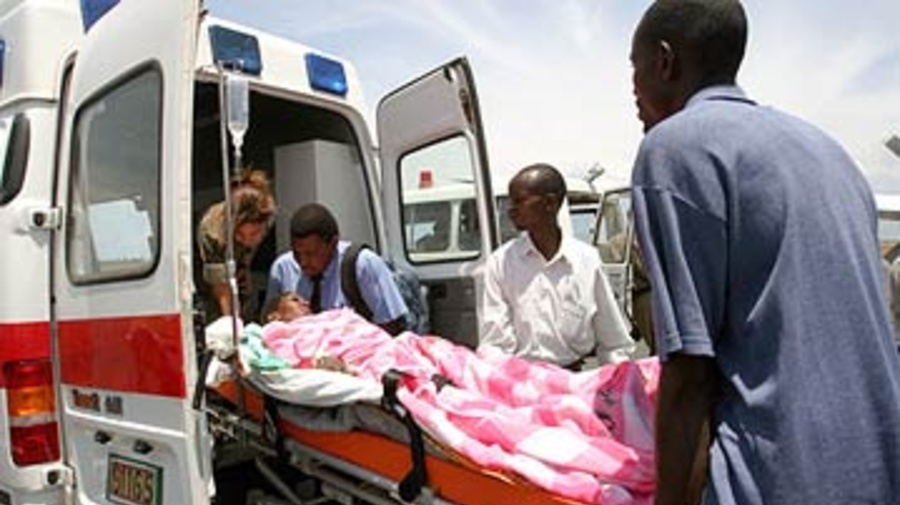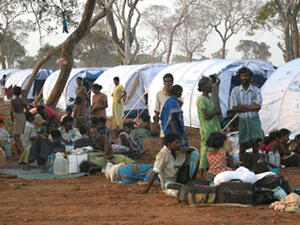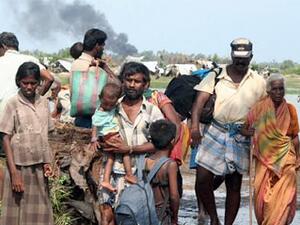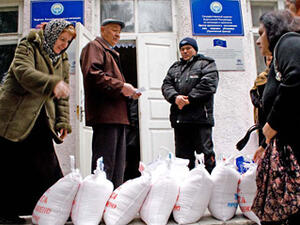Hundreds of Congolese refugees leave Burundi facilities
Hundreds of Congolese refugees leave Burundi facilities

UNHCR airlifts for medical treatment in Nairobi seven Congolese wounded in last month's attack on a Burundi transit centre.
BURUNDI, Sept. 7 (UNHCR) - Hundreds of Congolese refugees have returned to the Democratic Republic of the Congo (DRC) following the massacre of more than 150 Congolese in Burundi last month.
A team from the UN refugee agency that visited the Rugombo transit centre in Cibitoke province last week was told by the local governor and other officials that 500 Congolese had left the area in one day alone on Aug. 29. The team observed a significant drop in the centre's population.
The officials said "large numbers" of refugees were slipping back into the DRC, but UNHCR could not confirm the reports. It has no presence along the border for security reasons. Some of Rugombo's inhabitants have also sought accommodations with Burundians.
Rugombo was the biggest of three transit centres set up along the Burundi in the wake of a rebellion in June in the DRC's eastern province of South Kivu that prompted an influx of more than 20,000 Congolese refugees.
On Aug. 13, armed men attacked the Gatumba centre temporarily sheltering mainly Congolese of Tutsi origin, called Banyamulenge. At least 153 Congolese were killed in the centre located midway along the 30-km road between the Burundi capital of Bujumbura and the DRC town of Uvira. Seven other bodies were reported to have been found later in the bush outside the facility. Over 100 others were injured. On Monday, UNHCR airlifted seven of the injured for medical treatment in Nairobi.
The Burundi rebel group National Liberation Front has claimed responsibility for the massacre but preliminary findings of a UN investigation showed fighters from Rwanda and the DRC were involved. Rwandan Hutus blamed for the 1994 genocide of 800,000 Rwandans belonging to the Tutsi minority operate in the DRC.
Following last month's killings, UNHCR closed Gatumba and secured a long-pending request to move the Congolese in the transit centres to camps inland. Burundi and UNHCR officials are attempting to explain to the refugees the need to relocate them to secure facilities in Mwaro and Rutana provinces in central and south-western Burundi.
Despite the Aug. 13 incident, the voluntary repatriation of Burundian refugees in Tanzania continues. The UN refugee agency plans to help repatriate 150,000 Burundian refugees from Tanzania this year. More than 77,000 had returned with UNHCR as of Aug. 31. The return movement, at a monthly rate of more than 10,000, and the reintegration of the Burundian returnees have gone on smoothly, UNHCR officials said.
In Rugombo, some refugees requested UNHCR's help in repatriating to the DRC. The team said UNHCR does not consider that conditions in their area of origin allows for repatriation that is sustainable and can take place in safety and dignity. The team also reminded the refugees that the Burundian government has now allocated land away from the insecure border area to build refugee camps.
The team also visited a second transit centre in Cibitoke Province, Kararuma, and found a very different situation there. Kararuma was busy, and very populated. Many of the refugees in Kararuma are Banyamulenge, and they expressed no wish to return to DRC until the situation in their home region improves. The refugees asked many questions about the possible relocation to the new camps.
The Burundian government has said that it will close Rubombo and Karurama and UNHCR will provide assistance in the new camps to meet the refugees' needs for water, food, schools and sanitation.









